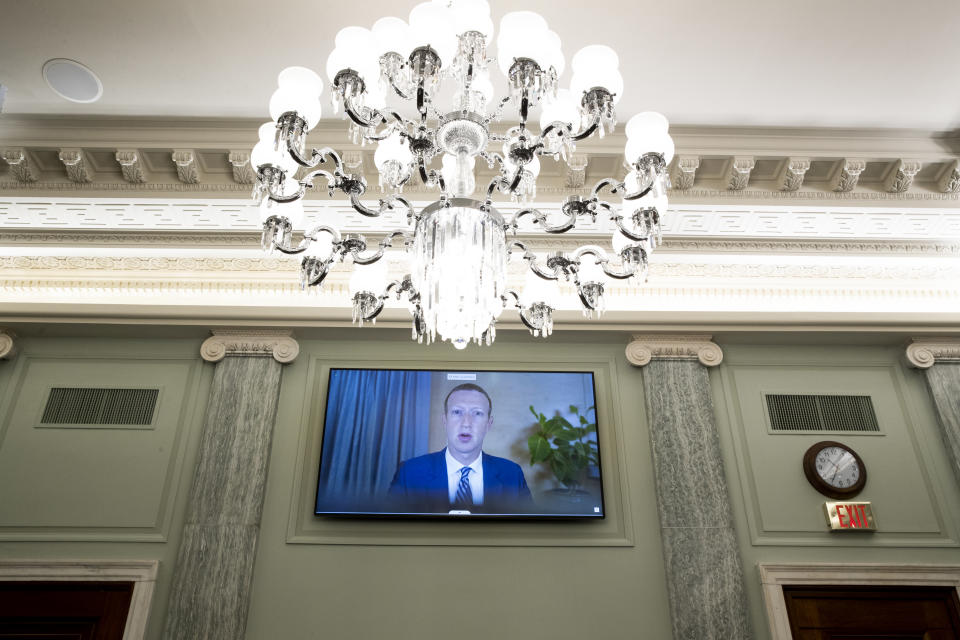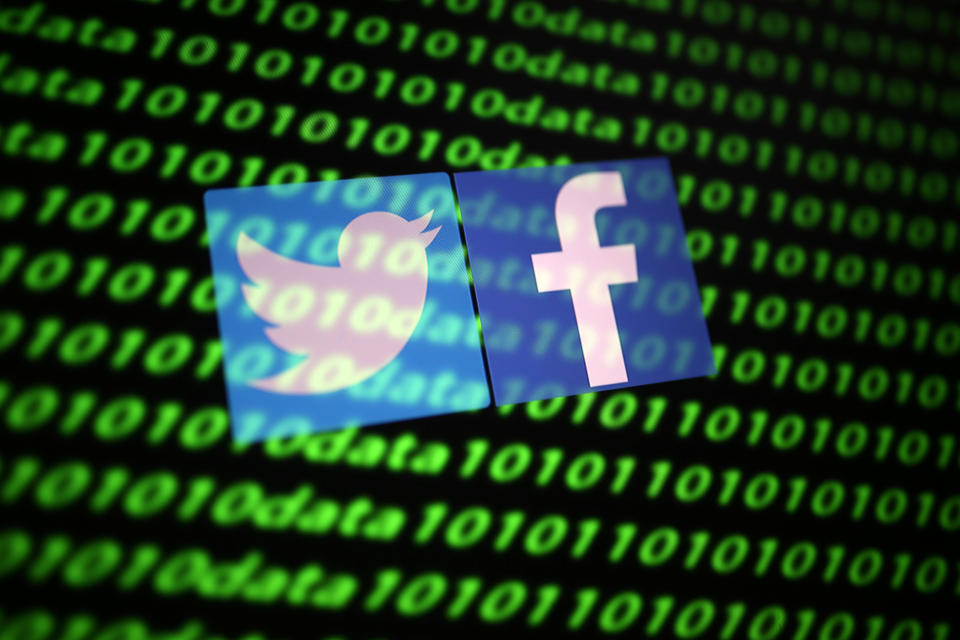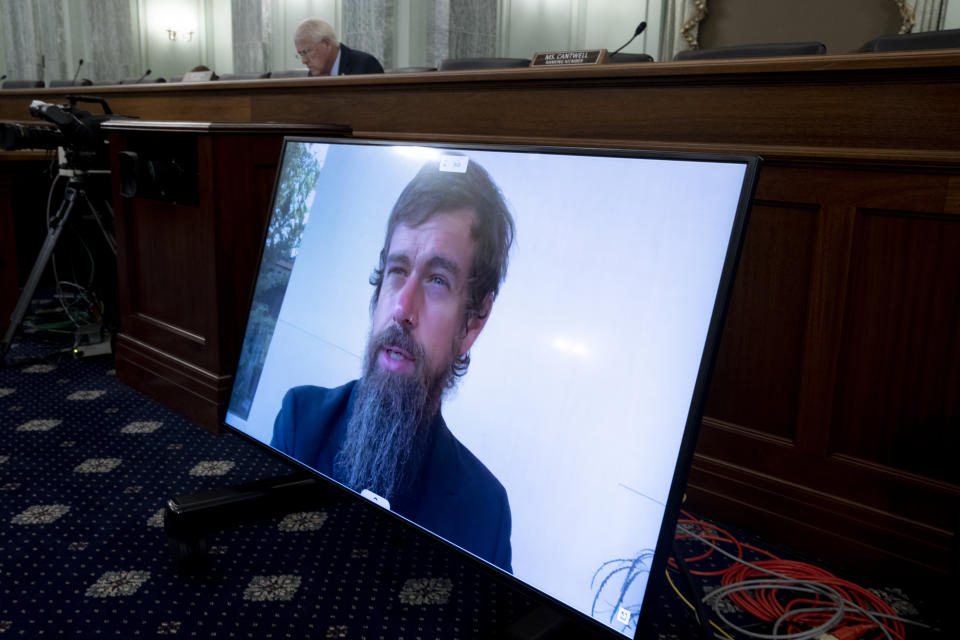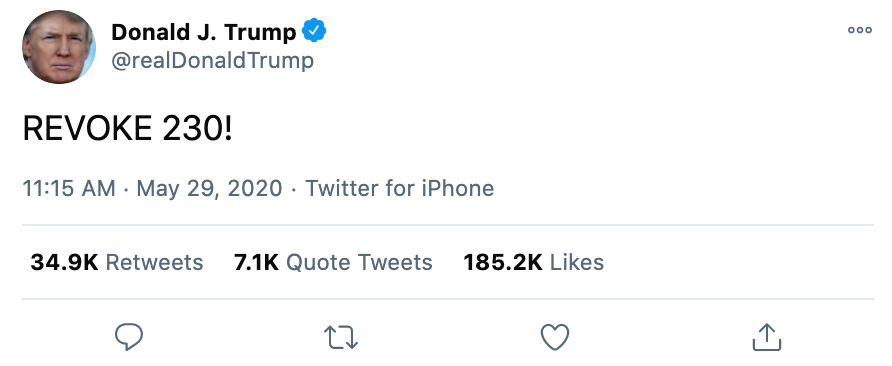Section 230 controversy: Lawmakers question Facebook, Twitter chiefs over content moderation
A 1996 law aiding a low-risk liability environment for online platforms that host user-generated content is again at the center of a Congressional inquiry Tuesday, with lawmakers needling Facebook (FB) CEO Mark Zuckerberg and and Twitter (TWTR) CEO Jack Dorsey with questions intended to elucidate if the once popular legislation should be changed or done away with altogether.
Section 230 of The Communications Decency Act was enacted more than two decades ago as the growing internet spurred fears that online pornography distributors would let their content fall into the hands of children. Today it is the subject of much wider concerns over the spread of false and misleading information and political bias.
“I think it’s fair to say that the internet has outgrown Section 230,” U.S. Sen. John Cornyn (R-Texas) said at Tuesday’s hearing, entitled “Breaking the News: Censorship, Suppression, and the 2020 Election.”
But changes to the law could threaten the business models of some of the world’s most influential companies. In prepared testimony on Tuesday, both Dorsey and Zuckerberg said they’re open to changes to Section 230 — but that the changes should only go so far.
With the 1996 Act, Congress amended the Communications Act of 1934, adopting a new provision introduced by Senator James Exon (D-Neb.) which outlawed transmission of all “indecent content viewable over the internet by any minor,” but the change was short-lived. As the U.S. Supreme Court ruled the amendment would violate free speech by cutting off adults from content to which they had a right to access, the sweeping authority gave way to a less encompassing amendment that was also part of the new law, and co-sponsored by former Rep. Chris Cox (R-Calif.) and then Rep. Ron Wyden (D-Ore.). It tiptoed around the First Amendment problem by permitting such content to be transmitted online, yet allowing platforms that host user-generated content to take “good faith” content moderation actions, without fear that the actions would lead to legal liability.
Now, that freedom is being challenged by both Democrats and Republicans. And lawmakers on Tuesday were expected to make varying cases for tinkering with it, albeit for different reasons.
“We have to be very clear, I think, about what problems we’re trying to address because Section 230 has become this very convenient scapegoat,” David S. Ardia, associate professor at University of North Carolina School of Law, told Yahoo Finance before the hearing.
Too much, too little moderation
Conservatives and liberals argue that platforms have carelessly wielded their moderation power, either moderating too much or too little, leading President Donald Trump and President-elect Joe Biden to call for Section 230’s revocation.
“Both sides of Congress would like to see it gone, because politicians don’t like...that there is a concentration of power that is beyond the reach of any national government to control,” John Deighton, professor of business administration emeritus at Harvard Business School, told Yahoo Finance. “Both don’t like it, but I think both sides probably see how very difficult it is to get rid of it...because I don’t think it’s much of an exaggeration to say it’s responsible for the multi-billion dollar industry in tech that’s concentrated in the United States.”
Another contention is that Section 230 gives platforms an unfair competitive advantage over journalism enterprises by empowering online platforms to take editorial actions free from the burden of expensive defamation lawsuits.
On the other hand, parties across the political spectrum agree that one of the most important benefits of Section 230 is that the low-risk of hosting user-generated content allows less powerful voices to be heard.
Conservative lawmakers have claimed that Section 230 has fueled anti-conservative content moderation. Progressives often dismiss the claim as unproven, while conservatives say the matter is unprovable, because tech companies resist transparency about their algorithmic and content moderation practices.
Liberal proponents have advocated for platforms to gain even wider moderation latitude, so that platforms can shield users from claims that, according to the platforms, are either untrue, misleading, or somehow objectionable. Libertarians tend to support keeping the law in place, reasoning that it enhances free speech because platforms can carry offensive content without fearing litigation.
“Both parties want to rein in the technology giants, but for different reasons; Democrats seem more focused on checking ‘Big Tech’—quintessential concerns about the size of companies and that these organizations concentrate wealth in too few hands from their POV,” Robert Siegel, lecturer in management at Stanford University, told Yahoo Finance before the hearing. “Republicans are concerned with the overwhelming partiality of the tech companies and their employees—from the relationship that Big Tech had with the Obama administration to the overwhelming financial support employees give to the Democratic Party.”
Whether or not there is political bias, too much moderation, or not enough moderation of content perceived as harmful, none of those questions are Section 230 problems, according to Ardia, because the platforms are both protected under the First Amendment, and not would not be subject to liability for their actions even if 230 didn’t exist.
“Has Section 230 increased the competitive advantage of platforms in terms of their power over other types of publishers? I think the answer to that is yes,” Ardia said, reasoning that the platforms have the luxury to forgo legal costs that traditional news organizations have to shoulder.
Tuesday’s hearing isn’t the first to examine whether 230 remains the best way to police the modern internet, but it is the first in response to specific content moderation decisions by Twitter and Facebook. Specifically, the CEOs were questioned about their decisions to curb the distribution of a controversial New York Post story, which accused Biden of lying about conversations with his son, Hunter Biden, about Hunter’s overseas business dealings.
After Twitter initially restricted the article from its platform, Dorsey later said the company’s decision to block the story was “wrong.”

Asked for its position on Tuesday’s hearing, the New York Post pointed Yahoo Finance to comments from its parent company News Corp’s chief communications officer Jim Kennedy.
“This is an important moment for journalism and for the freedom of the press,” Kennedy said about Twitter and Facebook’s decision to block the Biden story. “There is no evidence whatsoever that the documents are not authentic and the arbitrary blocking of the Post was a significant moment during a critical time in this election season. It also had a negative commercial impact, but the Post team was determined that principle should prevail and it has.”
‘No consensus’ on how to fix 230
In May, Trump signed an executive order that purportedly empowers the Federal Communications Commission (FCC) to interpret and issue new regulations for Section 230 of the Communications Decency Act by weakening its liability shield. The move, which could be adopted by or dispensed with by a Biden administration, was designed to make it tougher for social media platforms to moderate users’ content, especially political content, which the president contends unfairly targets GOP figures and right-leaning speech. On October 21, FCC General Counsel Thomas Johnson Jr. issued a statement saying that FCC Chairman Ajit Pai’s decision to move forward with a rule making to interpret 230 was within the FCC’s legal authority.
Dispensing with the law entirely could have its advantages, attorney Richard Lawson, who advocated for its disposal in The American Conservative, told Yahoo Finance. For one, online platforms would be forced to compete with publishers, where traditional defamation law applies.
“There is no logical reason to give protections to those who publish using 0s and 1s that are not extended to those who publish with ink and paper,” Lawson said. “CDA 230 allows social media companies to curate the content and experiences on their venue without any liability. Given this, they curate in a way to maximize engagement. Accordingly, the merits of this approach in the general health of society are up for debate.”

Eric Goldman, Santa Clara University School of Law Professor, told Yahoo Finance Live prior to the hearing that a major downside to removing the law’s protections is harming the very startups that could someday unseat today’s largest online platforms.
“So many people are attempt to equate the internet with Google (GOOG, GOOGL) and Facebook,” Goldman said, “...Section 230 protects the entire ecosystem, not just the people at the very top.”
Deighton, for his part, said that while the scope of Section 230 may need to be changed to better address issues of censorship and misinformation, the ability for platforms to moderate the content on their sites will likely remain in place to some extent.
“I don’t think Section 230 is a perfect solution to the problem,” he said. “It’s entirely possible to refine it. But I think its essential point, which is to say that you are not prohibited from moderating content, but you are entitled to moderate it, is quite an elegant principle and will likely survive in some form.”

Few 230 experts expected that Tuesday’s hearing would move the dispute into territory where it will see immediate change, or that the law under a Biden administration will get the priority that it did under Trump’s. One lawyer who handles FCC matters and asked not to be identified due to a conflict told Yahoo Finance that the FCC could issue a rule before the Biden administration takes over, or the Biden administration could use the FCC’s conclusions and public comments to inform its decision on whether or not the FCC has authority to interpret 230.
“There’s actually no consensus on how to fix it,” Goldman said.
Alexis Keenan is a legal reporter for Yahoo Finance and former litigation attorney. Follow Alexis Keenan on Twitter @alexiskweed. Daniel Howley is the tech editor for Yahoo Finance.
Got a tip? Email Daniel Howley at dhowley@yahoofinance.com over via encrypted mail at danielphowley@protonmail.com, and follow him on Twitter at @DanielHowley.
Sign up for Yahoo Finance Tech newsletter
Follow Yahoo Finance on Twitter, Facebook, Instagram, Flipboard, SmartNews, LinkedIn, YouTube, and reddit.
Find live stock market quotes and the latest business and finance news
For tutorials and information on investing and trading stocks, check out Cashay

 Yahoo Finance
Yahoo Finance 

